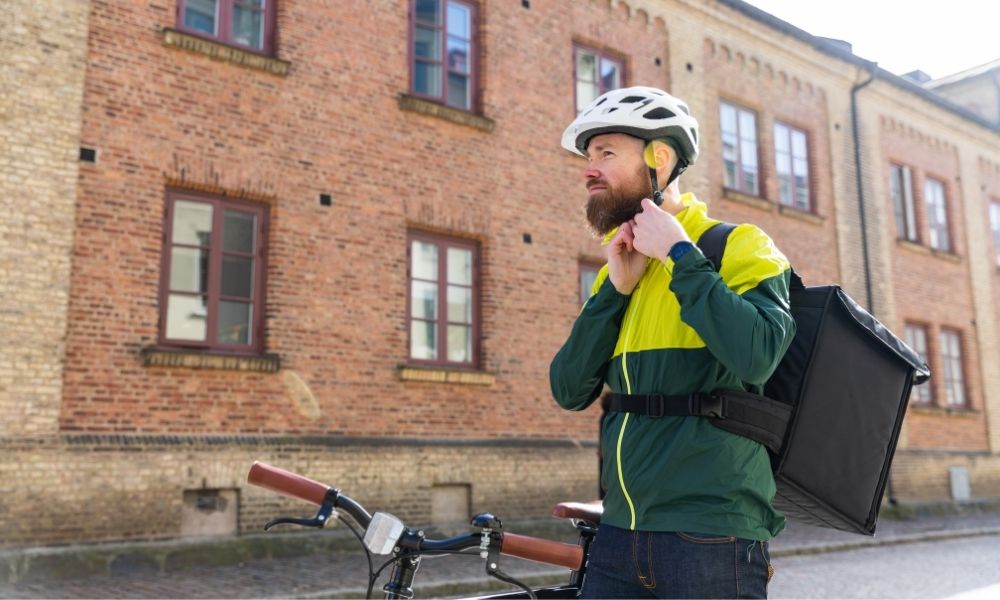We all know the saying “If it looks like a duck, swims like a duck, and quacks like a duck, then it probably is a duck”.
While that’s good news for ducks, workers in Australia’s $6.3 billion gig economy aren’t afforded the same clarity around their rights and protections.
In theory, it should be simple.
For example, in Queensland employers must insure ‘workers’ against work-related injuries with an accident insurance policy.
That means that dog walkers, ride-share drivers and food delivery riders—who often perform dangerous work, riding on busy roads in poor visibility—are insured against injuries or death at work, right?
Not always.
Many of these individuals are classified as independent contractors which means they do not receive the same benefits and protections as employees and cannot access state workers compensation schemes.
The Fair Work Ombudsmen (FWO) describes workers as having a “commercial relationship with the company that hosts the digital platform or the consumers who receive their services”.
The Ombudsmen says that while these arrangements are common and “can” be genuine, there are instances where platforms engage individuals as contractors instead of employees.
Given the grey area between employees and independent contractors, should these gig economy workers be treated as employees and receive the same protections and benefits?
Convenience: at what cost?

For consumers, the gig economy means incredible convenience. With the tap of a smartphone we can have a package sent across town, organise someone to mow the lawn, or have a Pad Thai or bottle of wine delivered to our front-door.
There are benefits for workers, too.
Uber Eats, the largest food delivery platform in Australia, spruiks the benefits of a “more flexible way to earn money”. They promise delivery workers the opportunity to “choose your own hours, be your own boss and deliver when it suits you”.
But this convenience can come at a cost.
Between September and November 2020 five gig economy workers were killed making deliveries for food delivery platforms Uber Eats, Door Dash and Hungry Panda.
If these riders had been delivering directly for a restaurant at the time of their deaths, they would most likely have been covered under workers compensation insurance.
Instead, compensation was limited to that outlined in their employer’s policies. These private insurance arrangements can have variable coverage and often fall short of the benefits provided by government schemes.
Several months before the spate of deaths, 30-year old Turkish-student Burak Dogan was killed while logged into the Uber Eats delivery app.
While Uber Eats’ insurance policy pays a $400,000 benefit in the event of death while working, the policy only covers riders or drivers while they’re making a delivery and for 15 minutes after a delivery or cancellation.
Mr Dogan cancelled his final delivery order at 12:25pm. Because he cancelled that delivery, his insurance coverage ran out 15 minutes later at 12:40pm—ten minutes before he was struck by a truck and killed.
As such, Uber Eats rejected his family’s claim, informing Safework NSW that as Mr Dogan hadn’t made or cancelled a delivery in the last 15 minutes, he wasn’t working.
Sacked for discussing safety concerns
Independent contractors have faced challenges discussing safety. The Fair Work Commission (FWC) is currently investigating a claim by food delivery driver Lawrence Du who was allegedly sacked by Easi after raising concerns about safety and remuneration.
While Easi considered him an independent contractor, the Transport Workers Union (TWU) argued that Mr Du was an employee and not a contractor. They point to Easi’s $400 up-front fee to work, the company’s rostered lunch and dinner breaks, and non-compete clauses.
It’s an argument with precedent. In May 2021 the FWC ruled that a Deliveroo rider sacked for being too slow was an employee and not a contractor.
FWC Commissioner Ian Cambridge said that the rider who was sacked by email during was unfairly dismissed through an "entirely unjust and unreasonable process".
Employee vs Contractor? What is the difference?
Most simply put, an independent contractor is someone who is their own boss and works for themselves, while an employee works for someone else’s business—employers control “how, where and when they do the work, and pays [their] wage”.
In practice, it’s more complex and there are a range of factors which need to considered together to determine whether someone is a contractor or an employer.
Some of these are clear cut—employees sign an employment contract and provide their TFN, while contractors provide an ABN and sign an independent contractor agreement—but others are more complicated.
For example, employees work under the direction and control of employer, while independent contractors have high-level control over the work they perform and how they do the work.
When you consider the earlier example of Easi’s designated lunch breaks or Deliveroo’s performance requirements, the delineation starts to blur.
What’s happening overseas?

In March 2021, after a five-year legal battle that went all the way to the Supreme Court, Uber in the UK announced it would treat its drivers as ‘workers’ (an employment category that doesn’t exist in Australia) rather than independent contractors.
In September a Dutch court ruled Uber drivers are entitled to the same employment benefits as taxi drivers. There have been similar decisions in other jurisdictions including Switzerland and New Jersey, while in California a judge struck down a ballot measure that exempted ride-share platforms from a law that classified drivers as employees.
What does this mean for Australia?
Sheryn Omeri, the barrister who successfully argued in the UK that Uber drivers are employees, suggests the decision will prompt tests of Australia’s local laws.
However, in April 2020 the full bench of the FWC rejected an unfair dismissal claim from Uber Eats driver Amita Gupta—who was dismissed for making late deliveries—ruling that Ms Gupta was not an employee of the company.
Ms Gupta and the TWU took their case to the Federal Court which in November 2020 found “no relationship of employment’. According to the TWU, the matter was later settled out of court for $400,000.
Did somebody say Menulog?
In April 2021 Menulog announced that it plans to move away from the independent contractor model within “a few years’ time”. The move would make Menulog the first gig economy platform in Australia to make all of its workers employees.
However, the food delivery company does not believe the current awards (devised in 2008-2009, well before platforms such as AirTasker or Uber operated in Australia) are appropriate for the gig economy. Menulog has submitted an application calling for a new modern award to cover ‘on demand delivery’.
The new award proposed by Menulog would provide an “an industry appropriate foundation for minimum employment entitlements to adopt an employment model”.
The commission will need to decide whether existing awards are appropriate, could be modified, or if a new award is required. Should Menulog’s application be successful, it would trigger discussions between Menulog and the TWU and other parties.
If it looks like an employee…
Currently, workers in the gig economy often perform dangerous work as independent contractors without the benefits and protections that they would receive as employees.
The proposal to develop a new award specific to the gig economy would go a long way towards providing clarity so that workers receive the benefits and protections—such as workers compensation—that they are entitled to.
